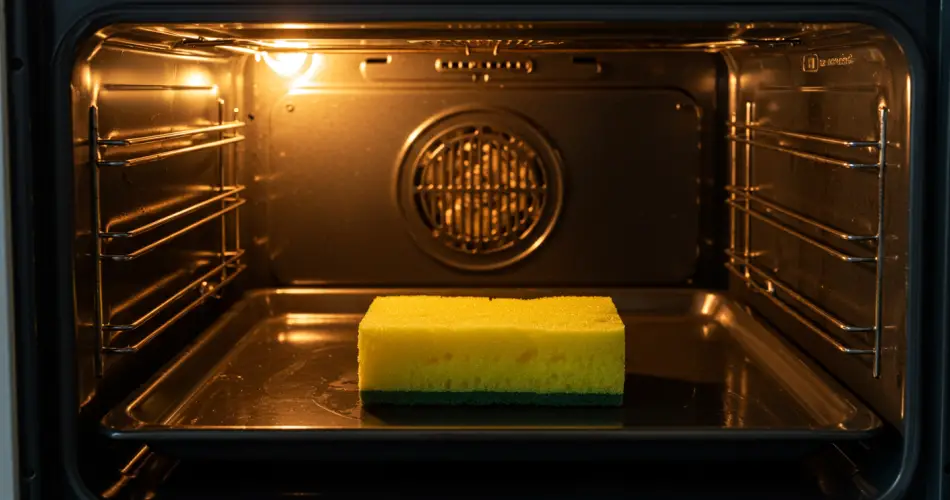Cleaning the oven is rarely anyone’s favorite household chore, but the task becomes even more daunting when it comes to cleaning oven racks that are caked with grease, grime, and food residues. Over time, repeated use leaves the metal grates heavily soiled, making them difficult to clean with standard washing methods. While there are plenty of chemical cleaning products available on the market, there’s a simpler, more natural, and cost-effective solution you can use at home. With just a few common ingredients and a sponge, you can restore your oven racks to their former glory.
The Challenge of Cleaning Oven Racks
Oven racks are exposed to high heat, spills, and splashes from roasting pans and baking sheets. This combination of heat and food residue leads to the buildup of stubborn crusts that are often greasy, sticky, and difficult to remove. Many people feel frustrated when scrubbing them, resorting to harsh chemicals that can be costly and may contain strong odors or potentially harmful substances.
However, natural household ingredients like baking soda and lemon juice can be just as effective, if not more, when used correctly. These ingredients are safe, eco-friendly, and already found in most kitchens. By combining them and applying the “sponge method,” cleaning your oven racks becomes significantly easier and less time-consuming.
The Benefits of Cleaning Oven Racks Regularly
Before diving into the cleaning method, it’s worth noting the importance of regular maintenance. Washing your oven racks after each heavy use prevents the buildup of crusted grease and food particles. By keeping up with routine cleaning, you avoid the need for more aggressive scrubbing later. Freshly cleaned racks not only look better but also help prevent smoke, lingering odors, and burnt residues during cooking.
Regular cleaning ensures that the oven functions efficiently and prolongs the lifespan of the racks. Grease buildup can reduce heat circulation and may even affect the taste of your meals. With this in mind, adopting a simple, natural cleaning routine is both practical and beneficial.
The Sponge Method: What You’ll Need
To clean your oven racks effectively using natural ingredients, you only need a few items:
-
Baking soda
-
Lemon juice
-
A simple kitchen sponge
Baking soda, also known as sodium bicarbonate, is a versatile cleaning agent. It is mildly abrasive, which allows it to scrub away tough residues without scratching surfaces. Beyond oven racks, baking soda can be used to clean a wide range of household surfaces, including countertops, sinks, stovetops, floors, and even appliances like dishwashers and washing machines. It’s a multipurpose ingredient that is invaluable to have at home.
Lemon juice is equally effective. Known for its natural degreasing properties, lemon juice breaks down grease and removes unpleasant odors. It’s also mildly acidic, which helps in dissolving stubborn food residues that cling to metal surfaces. Combined with baking soda, lemon juice forms a natural cleaning paste that is safe, non-toxic, and incredibly effective.
Step-by-Step Instructions
-
Prepare the paste: Start by creating a thick paste. Take one tablespoon of baking soda and mix it with the juice of one fresh lemon. Stir until the mixture forms a dense, spreadable consistency.
-
Apply to the sponge: Dip a clean kitchen sponge into the paste, ensuring it’s fully coated. You’ll use this to scrub the oven racks.
-
Scrub the racks: Begin rubbing the sponge over the crusted areas of the racks. Focus on spots with heavy grease or burnt-on food. The combination of baking soda’s mild abrasiveness and lemon’s acidic properties helps lift stubborn residues without damaging the metal.
-
Repeat as needed: For particularly tough spots, you may need to reapply the paste and scrub again. Persistence pays off—after a few minutes of scrubbing, you’ll notice the grime loosening and the metal surface becoming visibly cleaner.
-
Rinse and dry: Once the racks are clean, rinse them thoroughly with warm water to remove any remaining paste. Dry them completely with a towel before returning them to the oven.
Why This Method Works
The magic behind this method lies in the synergy between baking soda and lemon juice. Baking soda’s abrasive texture gently scrapes away the stubborn food residues, while the lemon juice dissolves grease and leaves a fresh, clean scent. Unlike harsh chemical cleaners, this method is safe for both your health and the environment. It doesn’t require prolonged soaking or toxic fumes, and it’s gentle enough to use on all types of oven racks.
Additionally, the method is cost-effective. Baking soda and lemon juice are inexpensive, easy to store, and can be used in countless other household cleaning applications. It’s a natural solution that works as well as—or better than—many commercial cleaning products.
Tips for Maintaining Oven Racks
-
Clean regularly: Wash the racks after each use to prevent heavy buildup. Even a quick wipe-down can make future cleaning easier.
-
Avoid harsh scrubbing tools: Metal brushes or steel wool can scratch and damage the racks. Stick to a sponge or soft brush.
-
Use hot water when rinsing: Warm water helps dissolve the paste completely and removes loosened grease effectively.
-
Optional soak: For extreme buildup, remove the racks and soak them briefly in a solution of warm water and baking soda before scrubbing. This softens stubborn residues.
Conclusion
Cleaning oven racks doesn’t have to be a stressful or time-consuming task. By using natural ingredients like baking soda and lemon juice in combination with a simple sponge, you can restore your oven racks to their original clean and shiny state. Regular maintenance, paired with this straightforward method, prevents heavy buildup and ensures a more hygienic, odor-free kitchen environment.
This eco-friendly, inexpensive approach is not only effective but also safe, leaving your oven racks sparkling without harsh chemicals. With just a little effort and a few household ingredients, cleaning your oven racks can become a simple, even satisfying, task.



